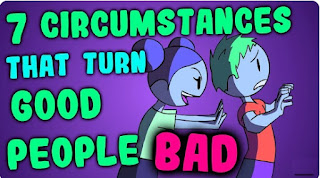Why Good People Turn Bad
Good people are lucky. Many of them don't know that they are one unfortunate event away from becoming bad. Those who do know can fortify their goodness, so that if unlucky circumstances arise, they won't be so quick to betray their principles.
For those of you wondering what these circumstances are that can turn good people bad, we've come up with a list of seven. This is by no means a complete list, but it contains situations that usually result in the most moral casualties.
One: Tragedy
When tragedy strikes you or someone close to you, it's hard not to blame something or someone, even if no one was at fault. A person can then become angry at people that don't deserve it. And when a person sees him or herself as a victim of tragedy, they may feel justified in treating people who have not suffered like they have.
Two: Poverty
When a person is in a less fortunate situation than everyone else, there's no measure too extreme to take. To a person in this situation, life becomes pure survival. Thus, they may rely on theft, assault, or worse, to acquire the resources that have been withheld from them.
Three: Addiction
Reliance on anything, especially drugs, can make a person betray their morals to maintain their comfort. A person whose life revolves around getting their fix, is capable of doing anything to accomplish this task. Addiction controls a person's life.
Four: Moral Superiority
When you do a good deed, you may feel morally superior to many people and perhaps, for a time you actually are. But those who feel morally superior often do not stay this way. In fact, this is the norm. Moral licensing is a phenomenon that occurs when people who do good deeds feel justified doing bad deeds. Essentially, for many people morality is a balancing act.
Five: Abuse
Abuse is a vicious cycle. People who have been abused often abuse others in the future, because that is all they know. Abuse can mean violence, manipulation, discrimination, or any non-consensual exploitation of others, to satisfy one's own desires. However, many people who are abused vowed to never inflict on to others, because of how intense their suffering was. These noble people break the cycle.
Six: Ideological Possession
Political and ethical causes are intoxicating. Every person wants to feel like they're contributing to the betterment of society, which means many of them will subscribe to ideologies that they identify as promoting the greater good. However, one person's greater good will always be in conflict with another person's. And how great is the good, if it prevents you from seeing people as people, and only obstacles standing in the way of your goal. People who are possessed by ideologies put a moral ideal above moral acts.
Seven: Affluence
Poverty is one end of the moral degradation spectrum, affluence is the other. Both circumstances can cause otherwise good people to become not so nice. When a person is affluent, meaning they have all the money they need, they might construe this as conceit, instead of luck. Such people, believing they worked harder or more intelligently than others who do not have the same wealth, are liable to view every bad-luck story as a cautionary tale about laziness. These people may have worked hard for their money, but circumstances, as always, has a larger share in their prosperity.
People can and do go through all the above situations and remain good, but it's much harder to remain good, when once challenged in such ways. Being bad under these circumstances is easy. Being good takes courage to fall and not want others to fall, too.
Did you learn something new today? If so, let us know in the comments section below.



Comments
Post a Comment